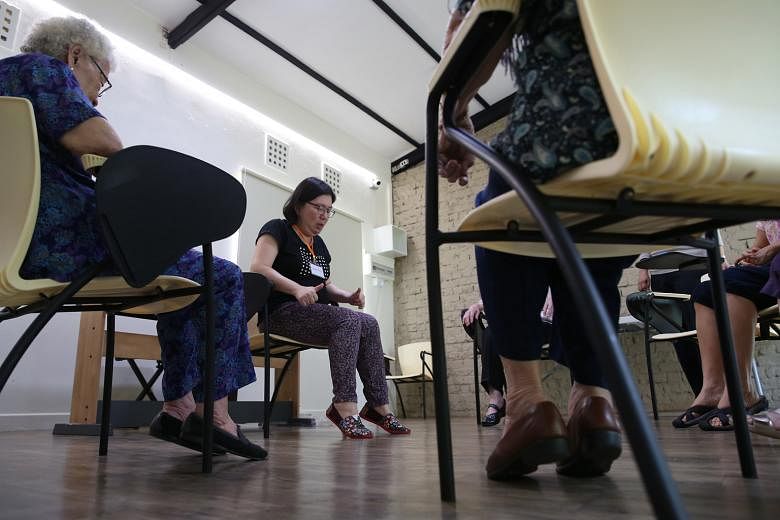On a recent Tuesday afternoon, five people with dementia met in a brightly-lit room at a small centre in Upper Bukit Timah to sing Chinese songs and do other activities.
There were song sheets printed in a larger font size to make for easier reading. When it was time for a break, the elderly participants poured Chinese tea out of a flask into their own cups.
At the privately-run Montessori for Dementia Care centre, clients rise to the challenge of their abilities, said its director, Dr Fong Chiu Yan.
"We discover they can learn new songs. We may have to break down the sequence and the steps so that it is simpler."
For those who reach a stage where they cannot talk, visual cues such as pictures and hand gestures are used to engage them, she said.
"Caregivers have said that it is different here. For example, we have a family who told us: 'Oh, we didn't know he could read. It's amazing that he could sing.'"
Centre manager Joseph Cheah added: "We teach them to be as independent for as long as they can. For example, we try not to feed them, so they don't lose that ability."
The centre now has about 20 clients. In February, it ran two master classes by Dr Cameron Camp, the American psychologist who adapted the Montessori methods for dementia care. More than 75 people attended the classes.
The Montessori education method for children was founded in 1907 by Dr Maria Montessori. It's about using a tailored approach to develop an individual's unique abilities.
In dementia care, activities are tailored to the person's level of competence, life history, likes and dislikes.
Ms Koh Hui Mien, a nurse clinician at the geriatrics outpatient clinic in Khoo Teck Puat Hospital (KTPH), which also uses some of the Montessori methods, said the aim is to help the person build his confidence.
At KTPH, the Montessori method is used to help patients retain their functional abilities in self-care or in higher-level tasks such as cooking, said Ms Koh.
The approach treats patients with respect and dignity, and keeps up their quality of life as much as possible as they gradually lose their mental functions.
Instead of focusing on the disease, it focuses on the individual and takes into account the person's qualities, abilities, interests, likes and dislikes.
Likewise, other enrichment programmes run by the Alzheimers' Disease Association's Family of Wisdom centres and the privately-run The Care Library strive to offer personalised care.
"Here, we get to know the participants intimately and we are constantly evolving to see which activity works for them, " said The Care Library director Esther Kwan.
For instance, it offers music activities but these are "not just a sing- along sessions", she said.
"We use music and other activities to trigger their thoughts and, in that process, engage their mind."
The Care Library's team includes Ms Han Huey Charn, who was once with Tan Tock Seng Hospital's (TTSH) MindVital programme, a dementia enrichment programme that ended more than two years ago.
Person-centred care has been around in the United Kingdom for about 30 years now.
It has caught on in Singapore only in the last five to eight years, said Dr Philip Yap, director of KTPH's geriatric centre.
"Today, we are more enlightened, we understand that people with dementia still have some abilities and we try to tap them," he said.
In the past, if a patient can't dress himself, the clothes are put on for him.
"Today, we say let's see where he has a problem and help him with that step," said Dr Yap.
This tailored approach trumps the one-size-fits-all approach to care, and can be adopted in different settings.
"If you maintain their independence for a longer period of time, functionally, the person retains his abilities and, hence, declines more slowly," said Dr Yap.
More importantly, "you are maintaining his self-esteem, identity and well-being", he said.
That's what Mr Bernard Teo, 59, values. He cares for his two aunts, aged 74 and 76, who have dementia. They attended TTSH's MindVital programme, then the Family of Wisdom enrichment programmes. Now, they go to The Care Library.
"Some people wonder if it's worth it to send them to these sessions. They just play games and drink tea," he said.
"But there's a difference. Once you get them into a programme where they are encouraged to connect with people and with their long-term memories, they become more alive and more cooperative.
"They feel they are not alone and they feel loved. The facilitators will hug them and it makes a difference," he added.
It has also made it easier for him to care for them, such as fixing the leaking roof in their house.
Before his aunts went for any programmes, they did not allow him to change or move a single thing in their house, he said.


